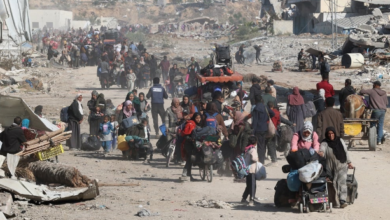IQAir report shows the best and worst places for air quality in 2021

Only 222 cities of the 6,475 analyzed had average air quality that met WHO’s standard. Three territories were found to have met WHO guidelines: the French territory of New Caledonia and the United States territories of Puerto Rico and the US Virgin Islands.
India, Pakistan and Bangladesh were among the countries with the worst air pollution, exceeding the guidelines by at least 10 times.
The Scandinavian countries, Australia, Canada, Japan and United Kingdom ranked among the best countries for air quality, with average levels that exceeded the guidelines by 1 to 2 times.
In the United States, IQAir found air pollution exceeded WHO guidelines by 2 to 3 times in 2021.
“This report underscores the need for governments around the world to help reduce global air pollution,” Glory Dolphin Hammes, CEO of IQAir North America, told CNN. “(Fine particulate matter) kills far too many people every year and governments need to set more stringent air quality national standards and explore better foreign policies that promote better air quality.”
IQAir analyzed pollution-monitoring stations in 6,475 cities across 117 countries, regions and territories.
“The (United States’) reliance on fossil fuels, increasing severity of wildfires as well as varying enforcement of the Clean Air Act from administration to administration have all added to U.S. air pollution,” the authors wrote.
Researchers say the main sources of pollution in the US were fossil fuel-powered transportation, energy production and wildfires, which wreak havoc on the country’s most vulnerable and marginalized communities.
“We are heavily dependent on fossil fuels, especially in terms of transportation,” said Hammes, who lives a few miles from Los Angeles. “We can act smartly on this with zero emissions, but we’re still not doing it. And this is having a devastating impact on the air pollution that we’re seeing in major cities.”
“This is all a part of the formula that will lead to or is leading to global warming.” Hammes said.
The report also unveiled some inequalities: Monitoring stations remain scant in some developing countries in Africa, South America and the Middle East, resulting in a dearth of air quality data in those regions.
“When you don’t have that data, you’re really in the dark,” Hammes said.
Hammes noted the African country of Chad was included in the report for the first time, due to an improvement in its monitoring network. IQAir found the country’s air pollution was the second-highest in the world last year, behind Bangladesh.
Tarik Benmarhnia, a climate change epidemiologist at Scripps Institution of Oceanography who has studied the health impact of wildfire smoke, also noted that relying only on monitoring stations can lead to blind spots in these reports.
“I think it is great that they relied on different networks and not only governmental sources,” Benmarhnia, who was not involved in this report, told CNN. “However, many regions do not have enough stations and alternative techniques exist.”
Hammes said the IQAir report is even more reason for the world to wean off fossil fuel.
“We’ve got the report, we can read it, we can internalize it and really devote ourselves to taking action,” she said. “There needs to be a major move towards renewable energy. We need to take drastic action in order to reverse the tide of global warming; otherwise, the impact and the train that we’re on (would be) irreversible.”
Source link





